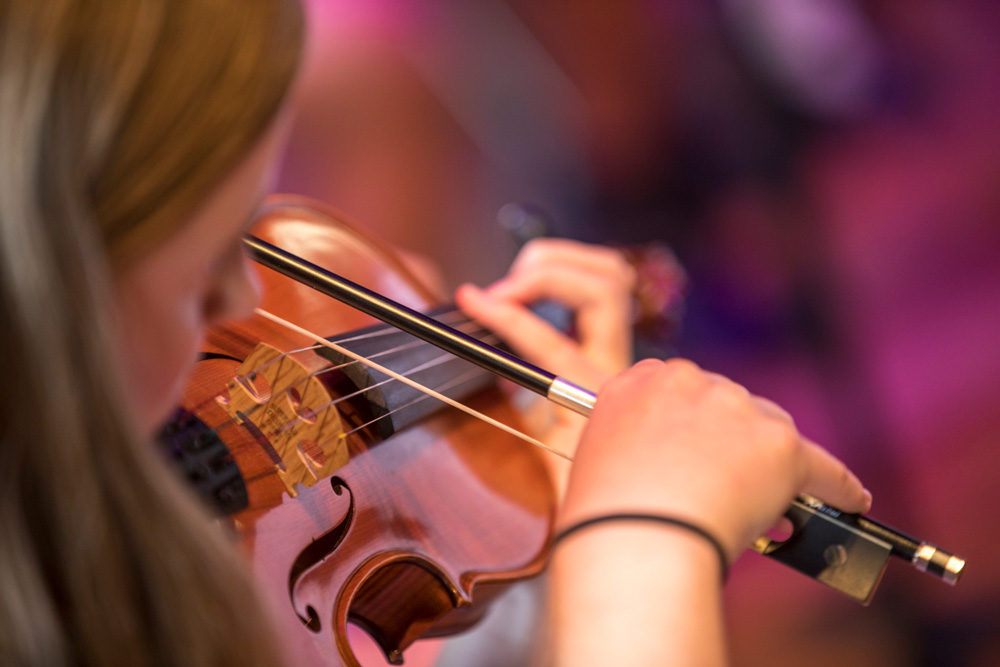
Does playing a musical instrument help students to learn? In a word: yes. Geoff Smith looks at the research.
Several decades of research suggest there’s a correlation between learning a musical instrument, or maybe even just listening to music, and academic success.
The Mozart effect
The so-called ‘Mozart effect’ led to something of a surge in sales of classical CDs back in the late 1990s, on the basis that listening to music improves memory and abstract reasoning. While most of the CDs spawned by the Mozart effect have probably gone to landfill by now, according to research, the Mozart effect has some merit in that it can provide certain short-term gains.
The explosion in popularity of this concept came with research by Frances Rauscher, Gordon Shaw and Catherine Ky, published in 1993 in Nature: The international journal of science, that discovered listening to music increased the abstract reasoning ability of college students, albeit for a limited time. The students who listened to Mozart did better at spatial tasks where they had to look at folded pieces of paper and predict how they would appear when unfolded.
Further research by Glenn Schellenberg and Susan Hallam has indicated that any music, not just Mozart, can show an improvement in the areas mentioned above. Positive benefits of music listening on cognitive abilities are most likely to be evident when the music is enjoyed by the listener. Before getting too excited about the implications for human learning, Rauscher has pointed out that the Mozart effect seems to be limited to spatial-temporal reasoning and doesn’t enhance general intelligence.
Practise, practise, practise: the benefits of motor learning
Whatever your musical preference, there is a way that music can make a difference to your IQ, but it requires a little more effort than listening to music. Learning to play a musical instrument can have a beneficial effect on your brain. Jessica Grahn, a cognitive scientist at Western University of London, Ontario says that a year of piano lessons, combined with regular practice, can increase IQ by as much as three points. According to Lutz Jäncke, a psychologist at the University of Zurich, the improvement can be even more. ‘Learning to play a musical instrument has definite benefits and can increase IQ by seven points, in both children and adults,’ Jäncke told the London Telegraph. ‘For children especially, we found that learning to play the piano, for instance, teaches them to be more self-disciplined, more attentive and better at planning. All of these things are very important for academic performance.’
Correlation or cause?
Of course, a correlation between learning a musical instrument and academic success does not necessarily mean the one causes the other. To find out more about that link, Adrian Hille and Jürgen Schupp in 2013 investigated a large scale set of data on German students and found that, even after controlling for a large number of parental background differences, those who begin to learn a musical instrument at the age of eight and continue until 17 were more conscientiousness, organised and ambitious. They concluded that the music students were about 15 per cent more likely to aim at completing upper secondary school and attending university. Whilst other leisure activities also positively benefit skill development, with respect to cognitive skills, school marks and conscientiousness, the effects of music are much stronger.
Hille and Schupp also note that music education promotes other ‘soft skills’ like collaboration and managing emotions that are themselves instrumental in enabling learning, a point made by Erin Bruns, a teacher and Science Faculty Coordinator at Wesley’s Glen Waverley Campus, in ‘Learn to collaborate? Collaborate to learn.’ It’s not just that music students learn soft skills along the way, though. As Careers Counsellors Alison Wray and Sue Bester at Glen Waverley explain, performance itself helps students develop soft skills like problem solving, cognitive flexibility and critical thinking by providing them with real-world opportunities for learning.
Music as a body-brain workout
Research that looks at neurological outcomes explains why. According to a TED-Ed presentation by Australian scientist and musician Anita Collins, playing an instrument is like a full body-brain workout that develops our cognitive function, memory, language acquisition, emotional intelligence and complex problem-solving ability. As Collins notes, ‘What we now know is that learning a musical instrument and foundation music education skills – such as clapping in time, singing in tune and moving to music – are some of the most complex cognitive activities the brain can undertake.
‘They involve the auditory, motor and visual cortices communicating at an astonishingly fast rate, while the cognitive, reward and sensory networks are sharing information, and the perception, emotion and cognition networks are making personal meaning from all the logical information the brain is processing.
‘After doing something so complex,’ says Collins, ‘our brains look at other tasks like reading, problem solving and conceptualisation and say: “Well, this is easy in comparison to music learning.”’
While researchers continue to investigate the link between music and learning, one thing is certain: playing a musical instrument keeps our students mentally, socially and emotionally fit to tackle all the things they set their mind to learn. And with more than 1000 students in 23 bands, 21 chamber ensembles, 16 choirs and 10 orchestras, and tutoring in more than 20 instruments, that’s a whole lot of learning.
Geoff Smith is Head of Music at Wesley’s Glen Waverley Campus.
